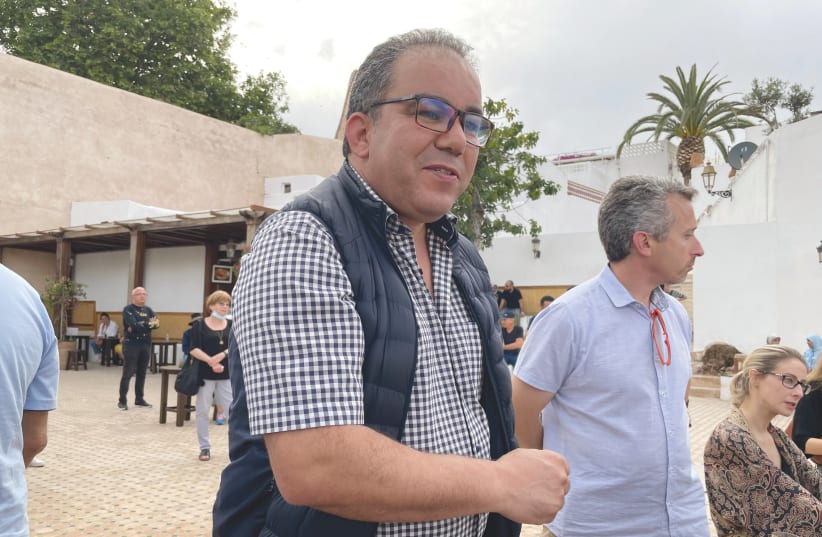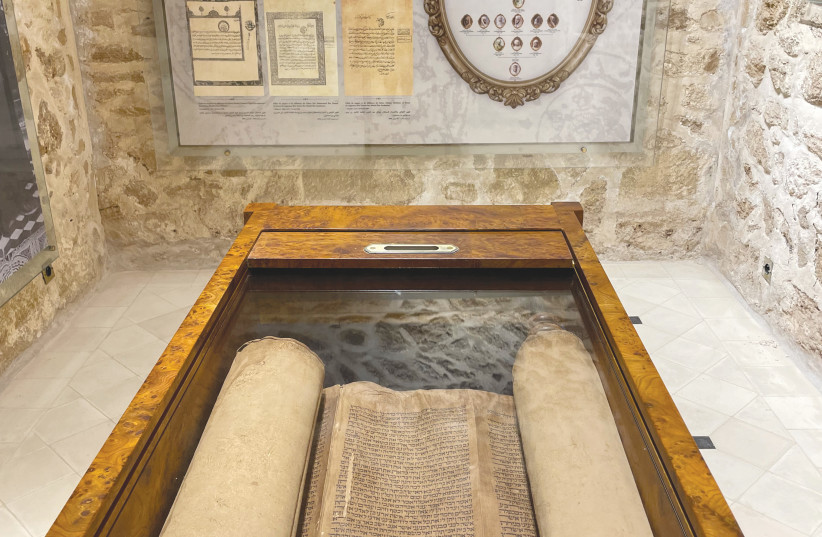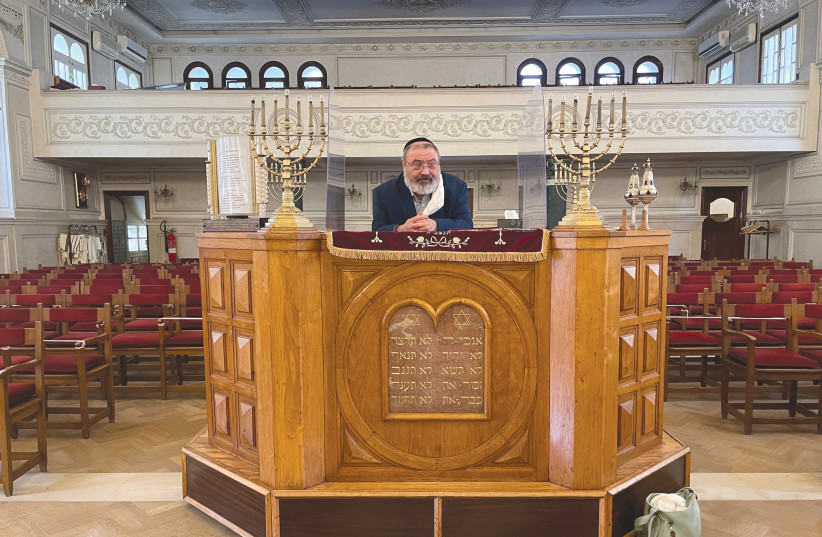CASABLANCA – Most of the Israeli delegates brought to Morocco by the NGO Sharaka, which seeks to nurture people-to-people ties between Israelis and residents of Abraham Accords countries, didn’t hear about the incident that made waves across the Middle East and North Africa until they were all on a bus out of the airport in Casablanca.
After all, it was a group of hi-tech and cultural entrepreneurs, and there were only two journalist-slash-news junkies among them, who saw the news and the enraged response after Al Jazeera journalist Shireen Abu Akleh was shot and killed while reporting in Jenin hours earlier.
But there was no avoiding it; the name Shireen came up almost every day of the weeklong trip. Al Jazeera is popular in Morocco, and the public knew Abu Akleh as a Palestinian icon; the false narrative spread throughout the Middle East that Israel had murdered her to hide the truth reached North Africa, as well.
Like all tension and clashes between Israel and the Palestinians since late 2020, Abu Akleh’s killing was a kind of stress test for the Abraham Accords, highlighting the inherent tensions in the situation, but also emphasizing the need to continue trying to build those relationships.
The day after the shooting, the group was supposed to visit the Moroccan parliament in Rabat, to meet with members of the progressive Authenticity and Modernity Party (PAM), the second-largest party in the legislature, which is supportive of normalization with Israel.
They canceled that morning, not wanting to be seen in a happy photo-op with a group of Israelis the day after the journalist’s death. A Moroccan minister, also on the schedule, dropped out as well. The cancellations by politicians continued throughout the week, though the cultural and business meetings – the real purpose of the trip – mostly continued. Police officers started popping up wherever the tour bus stopped, out of a concern that extra security may be needed.
A delegation member showed us messages he received from a Moroccan woman he knew who had just visited Israel: Delete all photos of me from your social media, she wrote, I’m being threatened.
One politician summed up the situation on a low-profile visit to the group made later that day, on condition of anonymity and that no photos be published in order not to risk the public’s ire.
“The recent unfortunate death of the Palestinian journalist and events that happened on Ramadan have an influence,” she said. “The media in Morocco is pro-Palestinian, and Moroccans have a lot of sympathy for the Palestinian cause.... Big events influence public opinion.”
At the same time, the politician said the official Moroccan position is different: “The Abraham Accords are here. They are a reality. Government collaboration is continuing, and official diplomatic ties are still ongoing.
“The post-Abraham Accords relationship between Morocco and Israel improved really fast. We put aside our differences about the conflict to focus on what our countries can do together,” she added.
The group also met with Israeli Ambassador David Govrin, who painted a fairly optimistic picture of the situation. While the rioting by Palestinians at al-Aqsa Mosque during Ramadan and the killing of Abu Akleh “make the development of ties more difficult,” relations between Rabat and Jerusalem “very quickly returned to normal” after Operation Guardian of the Walls last year, and he expected the same to happen now.
“The Moroccan public deeply identifies with the Palestinians,” Govrin said, but at the same time, Palestinian issues only “come up occasionally, mostly in times of crisis.”
The incident in Jenin highlighted the tension at the root of the Abraham Accords, in which Israel normalized ties in 2020 with three Arab nations – the United Arab Emirates, Bahrain and Morocco.
These countries are not democracies, though Morocco is in better shape than the others when it comes to civil liberties – the country is ranked “partly free” by Freedom House. Morocco’s relations with Israel were established via royal fiat, with varied, but generally middling efforts to explain their importance to a populace that had heard mostly negative things about the Jewish state up until that point. The government was not transparent with the people about why it signed the Abraham Accords, one activist said; relations were announced, and the papers just moved from calling Israel the “Zionist entity” to “Israel” and “our brotherly partners.”
THE RELATIONSHIP with Morocco is special to many Israelis, about a million of whom have roots in the country. Morocco is the only Arab country that still has a rooted, centuries-old Jewish community. (Only two other Muslim countries – Turkey and Iran – have such communities.)
Moroccans who met with the group mentioned that Jews lived among the indigenous Amazigh tribes, and that Judaism came to North Africa before Islam. Moroccans on the street heard us speak Hebrew and shouted phrases they had learned from the influx of Israeli tourists or wished us a Shabbat Shalom when we walked in the mellah, the historic Jewish quarter, in Marrakech on Saturday and helped us find our way to the S’lat al-Azama Synagogue, built by Jews exiled from Spain in 1492. We repeatedly heard that Jews and Moroccans are family, and this was incorporated into sales pitches at the souk.
As such, the politician who spoke on condition of anonymity said that the Abraham Accords didn’t come in a vacuum: “The links between Morocco and Israel have always been strong because of the strong Jewish community in Morocco and Israelis of Moroccan descent. The religious and cultural ties were already here, and now we’re resuming political ties that were on hold.”
Judaism is the only religion other than Sunni Islam recognized as native to Morocco. Jewish historic sites have been renovated with the support of King Mohammed VI, but efforts are made to help and protect the Jews who still live in Morocco, as well. Jews are acknowledged in the country’s 2011 Constitution, in an echo of the historic protections that Morocco’s royal family has offered Jews; King Mohammed V’s refusal to turn Jews over to the Nazis was a frequent refrain in our meetings. The Bet Din – the Jewish religious court – is the only place Jews can go to adjudicate family law issues, and Moroccans say theirs is the only country outside of Israel with dayanim, rabbinical court judges, on the government payroll.
At the same time, while Moroccan kings are beloved even by Moroccan-Israelis, and the Moroccan Jewish experience is frequently romanticized since it was peaceful compared to that of most Diaspora communities, the experience was still complex. Jews had dhimmi, or second-class-citizen status throughout much of history, and the beautiful historic mellah quarters in major Moroccan cities often functioned like ghettos, with Jews locked inside at night.
Casablanca-based Rabbi Israel Hazout expressed that complexity, proudly showing his Israeli visitors his official identification card as a judge – but he also said he wouldn’t recommend wearing a kippah on the street, lest it be seen as “a symbol of Zionism.”
The multiple functioning synagogues and Jewish schools in Casablanca are under constant police protection, Hazout said, so the community does not feel its security is threatened, not even when there are “echoes” of the Israeli-Palestinian conflict.
“There has always been antisemitism and there always will be, but it’s not life-threatening. People make comments on the street,” the rabbi said in flawless Hebrew.
When asked if there is a future for Moroccan Jewry, Hazout immediately answered “no”; most kids leave the country after graduating high school and don’t return.
MOUNIR KEJJI is not Jewish, but he is an activist against antisemitism and in favor of ties with Israel. He came to that position through his decades-long activism for indigenous rights and the history of Jews and Amazigh peoples living side by side for centuries.
“The Amazigh movement fights for relations with Israel,” Kejji said. “Judaism came before Islam in this land; no one can lie about the history. My father remembers Jews in his village; there were Jews in every village in the Atlas Mountains.”
Antisemitism increased with the rise of Islamism in Morocco, Kejji noted, and said that in his lifetime, “the shift to antisemitism came about 30 years ago with radicalism.”
Kejji visited Israel for a week in May 2015, to attend a conference against antisemitism, at the invitation of the Foreign Ministry, and called at the time for Israel and Morocco to reestablish diplomatic relations, which had been suspended in light of the Second Intifada in 2000.
“Many activists in Islamic movements, pan-Arabists, and Baathists attacked me on social media and in their newspapers. People who I knew stopped talking to me,” he said. “At the same time, I had friends who liked the idea. I had raised a taboo.”
Even though there was tension when Kejji spoke to The Jerusalem Post last week, he said antisemitism is in decline. In the past, there were massive protests against Israel and against normalization, but now the demonstrations are so small that their participants can easily be counted. Hazout said the government cracks down on open opposition to the Abraham Accords.
“Moroccans are pragmatic. The problems of the Middle East are not our problems.... We can’t solve other people’s problems,” Kejji said.
Kejji called Israel-Morocco ties a “win-win,” and said he has received hundreds of messages from Moroccans asking how they can visit Israel.
The shift away from extremism can be seen not only in the streets of Morocco, but in its politics. Islamists controlled the parliament in Rabat for much of the last decade, but were unseated in September of last year, and the current coalition includes PAM, the aforementioned progressive party, which is also pro-monarchy. As in many other countries in the MENA region, favoring the king and being progressive or liberal are not necessarily a contradiction; it is the ultraconservative Islamists who are the greatest challenge to the region’s monarchs, especially in the aftermath of the Arab Spring.
“Normalization with Israel plays a role in countering Islamist forces,” argued Ayman El Ghazi, a politician from the PAM party in the northern Tangier-Tetouan-Al Hoceima, facing the Strait of Gibraltar.
El Ghazi is responsible for the region’s international relations and ties with expats, and has organized interfaith meetings between Moroccan Jews, Muslims and Christians. He emphasized US recognition of Moroccan sovereignty in Western Sahara as the biggest benefit of the Abraham Accords for his country.
With the prospect of a new government that isn’t dominated by Islamists, El Ghazi said his region has been “working with the Jewish community to develop relations with Israel.... We are interested in twin city programs.”
But he still recognizes the challenges, speaking about a week after Abu Akleh’s death: “I regret that the media of the Orient has negative repercussions for interfaith dialogue between Israel and Morocco. We should work to change that.”
Moroccan entrepreneur Yousef Elazhari also railed against negative messages in the media.
“Let’s not be a medium to share propaganda,” he said. “I work in marketing; I know how binary the media makes things.... Hamas belongs to [Al Jazeera owner] Qatar. This is not something innocent. People need to pay attention.... This is a tragic event for all of us, but we need to focus on our mission and not be distracted by what just happened.”
Elazhari recently visited Israel with a group of tech entrepreneurs and said it was “beyond my expectations, one of the most inspiring experiences of my life.”
But at the same time, Elazhari faced pressure – “there were insults and threats because what I did was perceived as a crime” – and the co-founder of his start-up quit over the Israel visit.
“We are all people and have one God. I can’t accept that Israel is the enemy. I expected the insults, but I don’t care,” he said. “Moroccans are your family, your brothers.”
People who refused to meet Israelis in recent weeks were only postponing the meetings and will calm down, he said.
The Abraham Accords are still strong, Elazhari said, calling them a wise act of Mohammed VI that “emancipated people to express their will to see Israel.”
Chama Mechtaly, a Dubai-based Moroccan activist and artist who designs jewelry combining Jewish and Islamic symbols, led the Sharaka delegation to Morocco, and wrote at the outset that the mission of the trip was “to facilitate public-private partnerships and foster greater economic and cultural cooperation between Israel and Morocco.”
Despite the challenges brought on by the events in Jenin, Mechtaly was determined to continue in that vein.
“It’s a really sticky time for us to be here and engage with politicians and high-level people,” she admitted.
The Abraham Accords did not solve the Israeli-Palestinian conflict, “and we have a lot of work to do to create a space to openly communicate about things that won’t disappear,” amid “tons of miscommunications and propaganda,” she said.
Mechtaly said the people who canceled on the group were in favor of normalization and didn’t change their minds in the last week in a half, but backed out from a concern over their political careers.
“People who are willing to do this kind of work [to build ties with Israel] are still in the minority,” she said. “Our responsibility is to persist and continue to cultivate the relations we are able to make here and to keep nurturing them and communicating openly and honestly. It’s not too late.”•


